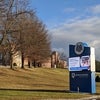Off the tracks
Commuters say schedule is holding the Boston-Worcester train back
The daily commuter rail between Boston and Worcester is a lot of things.
It's comfortable, easy on and easy off, sometimes scenic, allows for productivity, is bike-friendly and reasonably priced.
But according to regular riders of the rails, the qualities that make it shine aren't nearly enough to make up for its one glaring deficiency – it's just plain inconvenient, especially for those looking to do the "reverse commute" from Boston to Worcester.
The Massachusetts Bay Transportation Authority (MBTA) operates only two morning trains between Boston and Worcester. The first, departing Boston's South Station at 6:50 a.m. and arriving at Union Station at 8:01, is too early by most accounts, forcing riders to get up and get to the station a good hour before they feel they have to. The next train to Worcester doesn't depart until 9 a.m., when most people have to be at work, and arrives at 10:17. A one-way fare from Boston costs $7.75.
Far between
"I'm planning on getting a car sooner or later, so thankfully this is temporary," said Martina Tanga, who lives in Boston and works at the Worcester Art Museum. She hops aboard the train two or three times a week at Back Bay Station in Boston at 6:55 a.m. "I'm all for public transportation, I like the train. But it's just not very convenient."
Tanga's attitude was echoed by most other riders interviewed during a recent train trip between Boston and Worcester. Most seemed resigned to the exceptionally limited schedule, with a prevailing sense of "if only."
If only it were more predictable.
If only it were easier to get to.
If only the MBTA had a schedule that made sense.
"The biggest drawback is the restricted schedule. That's the biggest reason I don't ride the train more," said Nick Rhind, an assistant professor at the University of Massachusetts Medical School. Rhind rides the rails around twice a week from Wellesley Square, getting on at 7:15 a.m. He drives the other days. "If I have to be home early or whatever, there just aren't any trains."
Homeward bound
Heading eastbound is not much better for commuters at quitting time. There is only one feasible train for commuters, the 5:38 p.m. train that arrives in South Station at 6:59 p.m.
Christine Gervais, who works for the nonprofit Center for Women and Enterprise, said she rides the train once every few months for periodic meetings in Worcester. Originally from France, where trains are more widely used, she said she finds the MBTA schedule simply unacceptable.
"It's unbelievable that the only trains are at 6:55 or at 9 a.m.," said Gervais. "Most business meetings are at 9. Why get up early and get there at 8? For most meetings, you need a middle train."
Gervais said that four people from her Boston office were heading into Worcester a few weeks ago for a meeting. She was the only one who took the train.
"If they had better hours, they might get more people," she said.
The city manager's office said roughly 1,300 people per day board the commuter train in Worcester headed eastbound, according to 2005 statistics they obtained from the MBTA. On a typical weekday, more than 9,000 passengers board a westbound train from Boston along the Framingham/Worcester line, according to 2005 MBTA statistics, the most recent year for which such stats are available.
Bike friendly
Still, there are some who remain devoted to the train, despite its drawbacks. Katie Ferguson used to drive into work every day, but finds the train much more relaxing.
"I wouldn't commute any other way," said Ferguson, a technical writer at Charles River Labs in Worcester who's been riding since June of last year. "I've driven it before, and it sucks. The train is the way to go."
Ferguson gets on at Southborough every morning at 7:35.
"It's always a little late, of course," Ferguson said with a laugh.
Ferguson said she rides her bike to the station, boards with it and then rides to work. She finds the train very bicycle-friendly.
"I live in Marlborough, ride six miles to the train, then ride to work and then back," Ferguson said. "If there wasn't a train, I couldn't do that. It's really nice."
Rhind also rides his bike, and finds the exercise beneficial, not to mention the added time to himself in the mornings.
"If I drive, it takes 45 minutes. The train is 70 minutes," Rhind said. "It's longer, but not much. I can spend the time reading instead of sitting in traffic."
Ferguson said there is a certain stigma attached to the train that is unfair.
"There's a sense that trains are sketchy, or the people that ride them are off," Ferguson said. "Some people say 'Oh, I wouldn't feel safe.' That's not reasonable, they just haven't done it."
With a little added scheduling flexibility, all surveyed said they would take the train more often.
"I think the train is just plain better," Ferguson said. "For those willing to take a little inconvenience, its great. The problem is, most people just don't want to be inconvenienced at all"









0 Comments